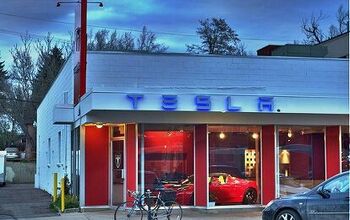Quote of the Day: What Does THAT Mean? Edition
From The Detroit News story on the National Highway Traffic Safety Administration’s (NHTSA) new Corporate Average Fuel Economy (CAFE) standards: The agency reckons it’ll cost automakers $47b to comply with the new regs. Automakers say more. As in please sir, can I have some more? Well, they would say that, wouldn’t they? But check this from the NHTSA “There is evidence that manufacturers cannot pass on to buyers the full costs of complying with higher CAFE standards.” Huh? Has the NHTSA been going over Detroit’s books? Or Is the evidence in question the existing Department of Energy’s $25b low-interest loans (the ipso facto answer)? Or has automaker lobbying already had an effect behind the scenes (the “here’s what we want to do but we all know they can’t possibly do it so maybe we should give them the money to do it with” answer)?
More by Robert Farago


































Comments
Join the conversation
"it’ll cost automakers $47b to comply with the new regs." That is ridiculous. I looked at this report by the Department of Commerce: “The Road Ahead for the Automobile Industry” 2008 [PDF], and, “U.S. Automotive Industry Employment Trends” 2006 [PDF]. First the totality of the industry (the OEMs). In 2001, 17.1 million new vehicles (cars & light trucks) were sold in the US, of which 11.7 million were manufactured in the US. In 2007, the numbers were 16.1 and 10.5. This year they will be less. In 2001 the industry employed about 280,000 people down from 290,000 a few years before. In 2007, it was about 225,000. I then looked at Honda, because they have new plants, no union contracts, and they just plain know what they are doing. They have published nice summaries of their North American operations. Honda has the capacity to manufacture 1.8 million vehicles, from 12 Plants employing 25,000 workers. The plants cost almost $11 billion. On that basis, a 12 million vehicle per year industry (assuming that we eventually get back to 2001 like numbers) would consist of about 80 plants and employ about 170,000 people and have a total cost of about $72 billion. The $47B must include all costs for new plant in the US for the next 20 years. Either that or they are dumping their legacy costs including VEBAs, pension buy-outs and severance into the number.
I think you are correct to state that this number is ludicrous overstated but an assembly plant is not the only plant you need for making cars. You also need engine plants etc. And those aren't cheap.
Barring the fact the $47Billion looks way too high, let me see if I am understanding this correct. They expect us to pay for the development, plant cost, etc. Then they are going to sell these wonder cars to us and then we have to pay for the technology AGAIN and give them profit. Why do I think there will be companies that won't be at the begging bowl(Honda) that were smart with their profits(Toyota) and who have been working at meeting these CAFE regulations for some time already so they can sell even more cars when the time comes gaining even more market share(from GM and Ford, Chrysler will be history). I'm tired of these companies that treat the government(taxpayers) as this never lose slot machine, and then expect consumers to be happy about shoveling out even more money .
Charly, that was all of Honda's US plants, it includes the engine plants. The $47B must include legacy costs.